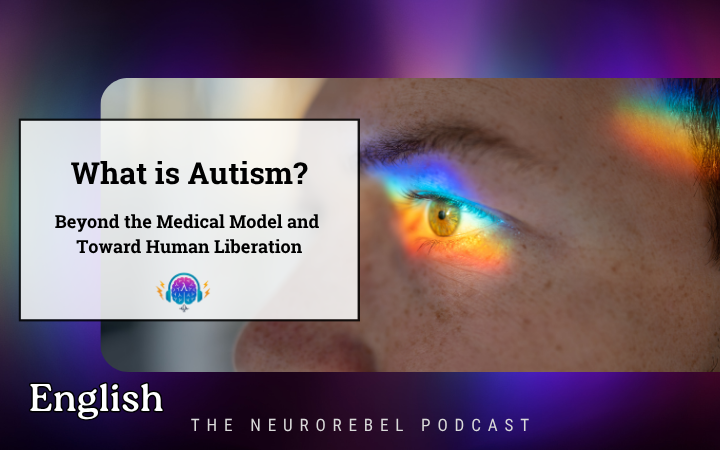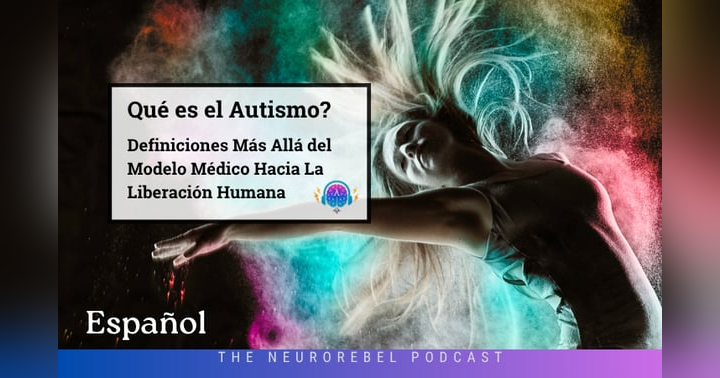What is Autism? Beyond the Medical Model Toward Human Liberation

What is Autism? Beyond the Medical Model Toward Human Liberation
Accompanying the NeuroRebel Podcast Episode: "What is Autism? A Journey Through a Kaleidoscope of Meaning"
The question "What is autism?" seems simple enough. Yet beneath its apparent simplicity lies one of the most contested and politically charged inquiries of our time—one that cuts to the heart of how we understand human difference, medical authority, and the very nature of what it means to be human.
For over eight decades, since Leo Kanner's 1943 clinical description, autism has been primarily understood through what we call the medical model—a framework that views autism as a disorder, deficit, or pathological deviation from neurotypical norms. But what if everything we've been told about autism is fundamentally wrong? What if autism isn't a medical condition to be cured, but a natural form of human diversity to be celebrated and accommodated?
Welcome to the revolution that's reshaping our understanding of minds, difference, and human potential.
The Collapse of the Deficit Paradigm
The medical model's approach to autism rests on a deceptively simple premise: identify what's "wrong" with autistic people and fix it. This deficit-focused lens has dominated research, intervention, and public understanding for generations. Yet when we examine this model critically, its foundations crumble under scrutiny.
The empirical failures are staggering. Take the cornerstone "Theory of Mind" hypothesis—the idea that autistic people cannot understand that others have thoughts, beliefs, and intentions different from their own. After decades of research and billions in funding, this theory has failed spectacularly:
- Only a fraction of autistic people fail "Theory of Mind" tests
- Performance correlates strongly with language ability, not autism specifically
- The tests themselves are culturally biased and methodologically flawed
- Most damning of all: autistic people demonstrate sophisticated social understanding in real-world contexts
The philosophical problems run deeper. The medical model operates through what researchers call "confirmation bias on steroids"—it begins with the assumption of deficit and interprets every finding through that lens. When autistic people show superior performance on visual-spatial tasks, this gets reframed as "weak central coherence." When they laugh only genuinely rather than strategically, this becomes a "social deficit." The model pathologizes strengths.
The ethical violations are profound. By systematically excluding autistic voices from research about autism, the medical model commits what philosopher Miranda Fricker calls "epistemic injustice"—the denial of someone's capacity as a knower. For decades, research "about us without us" has treated autistic people as objects of study rather than experts on their own experience.
Enter the Neurodiversity Paradigm: A Framework for Liberation
In response to these failures, a revolutionary alternative has emerged from autistic communities themselves: the neurodiversity paradigm. This isn't simply a call for tolerance or a feel-good celebration of difference. It's a sophisticated political, philosophical, and scientific framework that fundamentally reorders our understanding of human cognitive variation.
Core Principles of Neurodiversity
Neurodiversity as a biological fact: Just as biodiversity describes the natural variation in living systems, neurodiversity describes the infinite variation in human minds. There is no single "normal" brain—variation is the baseline, not the exception.
The paradigm as a political framework: The neurodiversity paradigm makes three radical claims:
- Ontological: Being neurodivergent is not inherently pathological—it's a form of difference, not deficiency
- Epistemological: Neurodivergent people must be central to creating knowledge about neurodivergence
- Ethical: Society must transform to accommodate human neurological diversity, rather than forcing individuals to conform to arbitrary norms
Intersectionality matters: Neurodivergence doesn't exist in a vacuum. It intersects with race, gender, class, sexuality, and other systems of power. The further someone deviates from society's "default settings" (white, male, cisgender, middle-class, neurotypical), the more barriers they face—not because of inherent deficits, but because society punishes deviation from its constructed ideals.
What Autism Actually Is: A Neurodiversity-Informed Understanding
So if autism isn't a medical disorder, what is it? Drawing on cutting-edge research from philosophy, anthropology, archaeology, and neuroscience, a radically different picture emerges.
Autism as a Coherent Way of Being-in-the-World
Phenomenologically, autism represents a distinct structure of experience—what researchers call a different "sensorium." This isn't a broken version of neurotypical perception, but a coherent alternative characterized by:
- Sensory intensity: The world is experienced with profound richness and often overwhelming detail
- Monotropic attention: Deep, sustained focus on fewer interests simultaneously (rather than the neurotypical tendency toward broader, shallower attention)
- Alternative social logic: Different but valid ways of connecting, communicating, and relating that follow their own internal consistency
Autism as Evolutionary Advantage
Archaeologically, evidence suggests that traits associated with autism have been present throughout human history and may have provided crucial evolutionary advantages:
- Specialized knowledge: The ability to develop deep expertise in specific domains
- Pattern recognition: Superior ability to detect regularities and anomalies in complex systems
- Innovation: Different approaches to problem-solving that drive technological and cultural advancement
- Systematic thinking: Ability to understand and create rule-based systems
The prevalence of autism-associated genes in the human population suggests these traits were positively selected—they made groups more successful, not less.
Autism as Cultural Identity
Anthropologically, autism emerges as a form of cultural identity deserving of respect and accommodation. Cross-cultural research reveals that behaviors considered "symptoms" in Western contexts are normal or even valued in other cultures:
- Direct eye contact with authorities is considered disrespectful in many Asian, African, and Latin American cultures
- Intense interests and expertise are celebrated in Japanese "otaku" culture
- Systematic, rule-based communication is more normative in cultures with higher social structure
This suggests that "autism" as pathology is partly a cultural construction—a mismatch between certain ways of being and specific cultural expectations.
The Stakes: Why This Matters
The question "What is autism?" isn't academic—it has life-and-death consequences.
For research priorities: Medical model research consumes billions seeking biological causes and cures, while autistic people prioritize research on mental health support, quality of life, and reducing discrimination. The framing determines where resources go.
For educational approaches: Medical model education focuses on making autistic students appear more "normal." Neurodiversity-informed education builds on autistic strengths and creates accessible learning environments.
For employment: Medical model approaches emphasize "fixing" autistic workers. Neurodiversity-informed workplaces recognize that autistic employees often bring unique value in pattern recognition, systematic thinking, quality assurance, and innovation.
For mental health: Medical model therapy often focuses on compliance and normalization. Neurodiversity-affirming therapy supports authentic self-acceptance and teaches practical life skills.
For human rights: Medical model thinking justifies discrimination, segregation, and elimination. Neurodiversity paradigm thinking demands accommodation, inclusion, and celebration.
The Double Empathy Problem: When "Social Deficits" Aren't Deficits
One of the most powerful illustrations of paradigm shift comes from autistic researcher Damian Milton's "Double Empathy Problem." Traditional autism research claims autistic people have "social communication deficits." But Milton's research reveals something different: communication breakdowns occur equally in both directions.
When autistic people communicate with other autistic people, communication is smooth and effective. When neurotypical people communicate with other neurotypical people, it works well too. The "deficit" only appears when neurotypes mix—suggesting the problem is cultural and bidirectional, not medical and unidirectional.
This finding demolishes decades of deficit-focused research and points toward solutions based on mutual understanding rather than one-sided normalization.
Autism Across Cultures: Exposing the Western Bias
The medical model's universal claims crumble when examined cross-culturally. Consider these contrasts:
Eye contact: In Latin American and many Asian cultures, children avoiding eye contact with adults demonstrate respect, not dysfunction. Yet Western diagnostic criteria pathologize this behavior.
Special interests: Japanese culture celebrates deep, focused interests through "otaku" traditions. What gets labeled "restricted interests" in medical contexts is cultural expertise in others.
Communication style: Cultures with more structured social rules naturally accommodate autistic communication patterns better than cultures that emphasize improvisation and social fluidity.
Sensory differences: Indigenous cultures often value individuals with heightened sensory awareness as having special gifts, while Western culture treats sensory sensitivity as pathological.
These cultural variations reveal that "autism" partly reflects a mismatch between certain neurocognitive styles and specific cultural demands—not universal pathology.
The Neuroqueer Revolution: Beyond Simple Inclusion
The most radical edge of autism reconceptualization comes through "neuroqueer theory"—a framework that fuses neurodiversity thinking with queer theory to challenge all forms of normative thinking.
Neuroqueer theory observes that autistic people often experience dissonance with gender and sexuality norms alongside neurotypical norms. Rather than seeing this as a coincidence, neuroqueer theorists argue that all normative systems interconnect—challenging one means challenging all.
"Neuroqueering" becomes an active practice of disrupting normative expectations through creativity, authenticity, and unapologetic difference. This goes beyond asking for tolerance to demanding the transformation of the systems that create "normal" and "deviant" categories in the first place.
From Theory to Practice: What This Means for You
Whether you're autistic yourself, love someone who is, or work with autistic people, this paradigm shift has practical implications:
If you're autistic:
- Your brain isn't broken—it's different, and that difference has value
- You belong in conversations about your own experience
- Your way of perceiving and processing the world is valid
- You deserve accommodations, not just tolerance
If you're neurotypical:
- Listen to autistic voices directly, not just interpretations by others
- Question assumptions about what's "normal" or "healthy"
- Advocate for accessible environments that work for different minds
- Recognize that neurodiversity benefits everyone
If you're a professional:
- Include autistic people as partners in research, not just subjects
- Focus on quality of life and well-being, not just compliance
- Learn about autism from autistic sources, not just medical texts
- Challenge systems that exclude or marginalize different ways of being
The Future We're Building
This paradigm shift points toward what researcher Ralph Savarese calls a "neurocosmopolitan" future—a world that doesn't just tolerate neurological difference but actively values it as essential for solving complex problems and creating rich, diverse communities.
Imagine educational systems that nurture different learning styles instead of forcing conformity. Workplaces that leverage diverse cognitive approaches for innovation and quality. Healthcare that supports flourishing rather than normalization. Communities that celebrate the full spectrum of human ways of being.
This isn't utopian dreaming—it's already beginning to happen as the neurodiversity paradigm gains traction in academia, advocacy, business, and policy.
The Question Remains: What Is Autism?
After examining autism through philosophical, anthropological, archaeological, and sociological lenses, a complex picture emerges. Autism is simultaneously:
- A neurological difference with genetic components
- A cultural identity deserving respect
- An evolutionary adaptation with survival value
- A form of human diversity enriching communities
- A political identity mobilizing for civil rights
- A phenomenological structure creating meaning
What autism is not: a medical disorder requiring cure, a tragic deviation from human norms, or a deficit that needs fixing.
The transformation in our understanding of autism reflects broader questions about human diversity, medical authority, and social justice. As we move beyond the medical model toward paradigms that center autistic voices and experiences, we don't just change how we think about autism—we change how we think about what it means to be human.
The old question "What is autism?" demanded a medical answer. The new question "What is autism?" invites us to explore the beautiful complexity of human neurological diversity and our capacity to build a world where all minds can flourish.
The revolution is already underway. The question now is: which side of history will you choose to stand on?
This blog post accompanies the NeuroRebel podcast episode "What is Autism? A Journey Through a Kaleidoscope of Meaning." For a deeper dive into these ideas, listen to the full episode wherever you get your podcasts, and explore the research citations and resources in our show notes.
NeuroRebel is a bilingual podcast challenging everything you thought you knew about neurodivergence. Subscribe for weekly episodes that blend academic rigor with lived experience, philosophical depth with practical application, and revolutionary thinking with compassionate community building.







